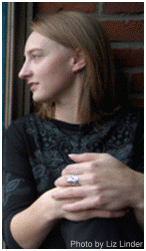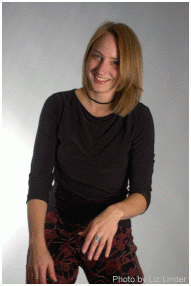|
An Interview with


Boston Beats: Could you state your name,
age and occupation for the record please?
Teresa Storch: Okay. Teresa Storch. Age, thirty-one.
And my
occupation is ďperforming songwriterĒ and ďweb developer.Ē
BB: Could you give us a little history
about yourself?
TS: Sure. Well, I grew up in Omaha and did childrenís theatre
and performed with Ballet Omaha. I went
to college to study engineering in Golden, Colorado. In college is
where I started to get into
the music scene. I would go to shows all the time. I
lived there for eight years and saw some really great
artists.
BB: How did you first get into music, and
when did you learn to play?
TS: I was at a Lyle Lovett show at Red Rocks Amphitheater in
Colorado when I turned to my boyfriend and told him I want to do this.
I want to be playing
in front of people. I had always been into music, ever since I was
little, and always into dance. Although I was pretty shy as a child,
I used to put on
shows for my family and friends. I took guitar lessons for 3 months
when I was 13 and quit. Through high school and college I sang a lot
in choir and studied ballet, but it wasnít until after college that I took
my first formal voice training and picked up the guitar again. The
voice class was therapy for me because it focused on getting over your
fear of
performing. I was writing music and doing some open mics while I was
in Colorado, but I didnít really do my serious playing until I came to
Boston.
BB: What made you decide to make the move
from Boulder to Boston?
TS: I had a roommate that was from Boston. She introduced me to artists like
Martin Sexton, and she knew Boston
musicians like
Peter Mulvey and
Patty Griffin
to name a few. It really just became music that I fell in
love with. When she moved back to
Boston, I decided to leave my ballet and engineering life behind in
Colorado and go surround myself with the music I loved and focus on
performing.

SONGWRITING AND INFLUENCES
-----
BB: When did you write your first song?
TS: When I was about 20 I wrote my first song, but I didnít play
guitar or even have one
then. I completed my first song with music a few years later when I
got a guitar as a gift. I started guitar lessons mainly so I could
write. I first played them for people in my voice class and then
moved on to open mics.
BB: Do you still perform your earlier
songs?
TS: The first song no, but the second song is something I still use.
I like the first song, but I
just need to revisit it.
BB: Tell me about your songwriting style.
TS: I usually start with a mood or an emotion and from that I
develop a rhythm. Other times Iíve written the lyrics and then gone
back and applied music to them, but that can get tricky trying to get
words to fit into a rhythm. I often have a melody in my head though
when I am writing.
 BB:
What music has influenced you? BB:
What music has influenced you?
TS: My first influences go back to high school, and it was the
Indigo Girls and
Melissa Etheridge. In college it was
more like
Dave Matthews and
Tori Amos. Tori was very
interesting to me. I just loved her candidness and she seemed to be
connected to something else. Watching her and others like her, I
just loved seeing someone so genuinely free. I wanted some of that
freedom.
BB: How would you describe your style?
TS: My friend Bob Sinclair once described my style as ďdreamy and
intellectual,Ē and that seemed really cool to me. I try to just really
play with passion. Iím not really a "strum-strummy" type of
guitarist Ė is that even a word? I always go for truth, so I would hope
that come across in my performing.
RECORDING
-----
BB: How has your experience been recording
music?
TS: Making my CD was for me (having never been in a studio before),
one of the most overwhelming and amazing experiences of my life. I
was able to create the music that I had in my head. The electric
guitar and full band really added so much to the songs. I literally
cried when I was able to hear the final product. To me it was a
hundred times better than I
could have imagined. And I still havenít really been pushing my CD.
It wasnít until just recently that I was introducing it to radio stations.
Once it was made I think I really didnít know what to do with it.
Possibly because I went in thinking I was just going to use it as a demo
for getting gigs.
BB: On your CD you have a full band, but
for the most part, you play solo shows. Has that been a factor when you
use the CD to shop for gigs?
TS: No, not really. At least not yet. Actually, what
comes to mind is a "coffeehouse" concert series I know of that they hold
in a church. They were looking for artists and someone who organizes
it heard me playing in the subway. She wanted me to send her a CD so
she could tell the others at the church about me. She emailed me
asking asking if I had another CD because it wasnít what she was
expecting, I guess it was just a little too rockiní. In that case I
was able to send her a demo of just me and my guitar.
PLAYING OUT
-----
BB: What makes a good show, and what has
been your best show so far?
TS: I think that my most recent show was my best show so far.
It was at the Midway Cafť. What makes a good show is when people are
really listening and there arenít a lot of distractions. Itís just
easier for me to do my job because Iím not distracted either and Iím not
fighting for their attention. When I can connect with the audience,
I can just feel this energy
go through me. Itís really like some power greater than myself.
Sometimes I have to get out of my own way to have a better show.
Thatís sort of the goal for me anyway, to get out of my head and drop
anything that has been going in the day and just be in the moment.
And that is really what I hope happens for my listeners as well.
Talk about a great job. I mean, what else could I want to do with my
life? Music, I think, allows us to feel, since we aren't allowed to
really "feel" in our normal workday. It's a release to help us deal
with whatever may be going on in our lives.
BB: Do you do any interesting covers?
TS:
Tom Waitsí ďChocolate Jesus.Ē I do
the typical
Ani DiFranco and
Joni Mitchell covers. Iíve been
covering
Tom Pettyís ďWild Flowers.Ē
BB: Do you have any pre or post show
rituals?
TS: I usually do some yoga or stretching to get into my body. I think it
harkens back to my ballet days when that was just what you did before a
show. If Iím doing a three-hour show I usually do a little less because I
donít want to be wiped for the show.
BB: What are some of your favorite places
to play?
TS: I really like The Burren, and The Kendall Cafť was always great
and right near my work. It was really my favorite; I could tell people in
my office to just go across the street and check me out tonight, and that
was pretty cool. Iíve been playing at Abbey Lounge, which is a nice
 and
unpretentious place to play. Club Passim is fun, and there is just such a
history there. I actually feel like I havenít played a lot of different
places. I end up going back to the same ones. and
unpretentious place to play. Club Passim is fun, and there is just such a
history there. I actually feel like I havenít played a lot of different
places. I end up going back to the same ones.
BB: Which artists in the Boston scene would
you most like to play with?
TS: The people I had on my CD would be great. We really donít get to
play out a lot. Playing with
Tom Bianchi would be cool, or opening
for Peter Mulvey.
BB: Who are some of your favorite local
musicians?
TS:
Erin McKeown is amazing, as is
Ryan Montbleau.
Danielle Miraglia and
Lisa Bastoni,
and
Burt LaFontaine are people to check out.
IN CLOSING
-----
BB: What do you hope people will get out of
your music?
TS: Iím a little bit idealistic I guess. I just hope that I am
giving people something that they can use to help them get through life. I
know that music has helped me and I would hope that I could give something
back. It blew me a way once when someone came up to me and said that my
music really helped them out...because, thatís really the whole point.
BB: What advice would you have for aspiring
local musicians?
TS: Keep putting yourself out there. Someone once told me something
that really helped me out. That no matter what the outcome of a show,
youíre still the same person you were when you went into the show. You
canít know what people are going through in their
lives and if you arenít connecting or had a rough show, that isnít
necessarily a reflection of you. I played once where there were people
trying to have a lunchtime meeting right in front of me and I could tell
that they didnít want me there. I had to just say, oh well and thereís
nothing I can do about that. It can be tough because you want to be
open and sensitive to make a connection with the audience, but if you do
that and theyíre not connecting or worse, it can really hit you.
BB: Thanks, Teresa. Itís been a pleasure
talking with you.
TS: Well thank you. This has been really fun.

To learn more about Teresa Storch, visit her website
at
http://www.teresastorch.com/
*Pictures courtesy of
http://www.teresastorch.com/
|